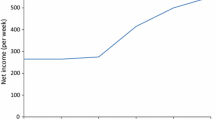Abstract
Changing the income tax progressivity in labour markets with collective wage bargaining generates a trade-off. On the one hand, higher progressivity distorts individual labour supply decisions at the hours-of-work margin, on the other hand, it reduces unemployment by exerting downward pressure on wages. This trade-off is quantitatively assessed using a numerical model for Germany. The model combines a microsimulation module, which captures the labour-supply decisions of approximately 4,600 individual households, and a macro (computable general equilibrium) module, which features collective wage bargaining and involuntary unemployment. In the simulations carried out using this model, the optimal degree of tax progressivity turns out to be higher than the one in the actual German tax schedule. The optimum is located at marginal tax rates that are 6 percentage points higher than the actual rates (combined with a transfer that balances the public budget). The welfare gain from such a reform is modest, however. It amounts to no more than two euros per person per month.
Similar content being viewed by others
References
Aaberge, R., & Colombino, U. (2008). Designing optimal taxes with a microeconomic model of household labour supply. CHILD Working Paper 06/2008.
Aaberge, R., Colombino, U., & Wennemo, T. (2006). Evaluating alternative representations of the choice set in models of labour supply. IZA Discussion Paper 1986.
Armington P. S. (1969) A theory of demand for producers distinguished by place of production. IMF Staff Papers 16: 159–178
Arntz M., Boeters S., Gürtzgen N., Schubert S. (2008) Analysing welfare reform in a microsimulation-AGE model: The value of disaggregation. Economic Modelling 25: 422–439
Ballard C. L., Fullerton D., Shoven J. B., Whalley J. (1985) A general equilibrium model for tax policy evaluation. The University of Chicago Press, National Bureau of Economic Research, Chicago
Böhringer C., Boeters S., Feil M. (2005) Taxation and unemployment: An applied general equilibrium approach for germany. Economic Modelling 22: 81–108
Boeters S. (2011) Optimal tax progressivity in unionised labour markets: What are the driving forces?. Economic Modelling 28: 2282–2295
Boeters S., Feil M. (2009) Heterogeneous labour markets in a microsimulation-AGE model: Application to welfare reform in Germany. Computational Economics 33: 305–335
Bourguignon, F., & Spadaro, A. (2005). Tax-benefit revealed social preferences. Paris-Jourdan Sciences Economiques Working Paper 2005-22.
Buslei, H., & Steiner, V. (1999). Beschäftigungseffekte von Lohnsubventionen im Niedriglohnbereich, Nomos, Baden-Baden.
Conesa J. C., Kitao S., Krueger D. (2009) Taxing capital? Not a bad idea after all!. American Economic Review 99: 25–48
Creedy J., Kalb G. (2005) Measuring welfare changes in labour supply models. The Manchester School 73: 664–685
de Mooij, R. A., & Ederveen, S. (2001). Taxation and foreign direct investment, a synthesis of empirical research. CPB Discussion Paper 003.
Duncan A., Weeks M. (1998) Simulating transitions using discrete choice models. Papers and Proceedings of the American Statistical Association 106: 151–156
Ericson, P., & Floot, L. (2009). A microsimulation approach to an optimal swedish income tax. IZA Discussion Paper 4379.
Falk, M., & Koebel, B. (1997). The demand of heterogeneous labour in Germany. ZEW Discussion Paper 97-28.
Fortin B., Truchon M., Beauséjour L. (1993) On reforming the welfare system: Workfare meets the negative income tax. Journal of Public Economics 31: 119–151
French K. R., Poterba J. M. (1991) Investor diversification and international equity markets. American Economic Review 81: 222–226
Hersoug T. (1984) Union wage responses to tax changes. Oxford Economic Papers 36: 37–51
Holmlund B., Kolm A.-S. (1995) Progressive taxation, wage setting and unemployment: Theory and Swedish evidence. Swedish Economic Policy Review 2: 423–460
Homburg S. (2007) Germany’s company tax reform act of 2008. FinanzArchiv 63: 591–612
Koskela E., Vilmunen J. (1996) Tax progression is good for employment in popular models of trade union behaviour. Labour Economics 3: 65–80
Lockwood B., Manning A. (1993) Wage setting and the tax system—Theory and evidence for the United Kingdom. Journal of Public Economics 52: 1–29
McFadden D. (1974) Conditional logit analysis of qualitative choice behavior. In: Zarembka P. (ed.) Frontiers in economics. Academic Press, New York, pp 105–142
Mirrlees J. A. (1971) An exploration into the theory of optimal income taxation. Review of Economic Studies 38: 175–208
Perroni C., Rutherford T.F. (1995) Regular flexibility of nested CES functions. European Economic Review 39: 335–343
Pissarides C. A. (1990) Equilibrium unemployment theory. Basil Blackwell, Oxford
Saez E. (2002) Optimal income transfer programs: Intensive versus extensive labour supply responses. Quarterly Journal of Economics 117: 1039–1073
Sørensen P. B. (1999) Optimal tax progressivity in imperfect labour markets. Labour Economics 6: 435–452
Tuomala M. (1990) Optimal income taxation and redistribution. Oxford University Press, Oxford
van Soest A. (1995) Structural models of family labor supply: A discrete choice approach. Journal of Human Resources 30: 63–88
Author information
Authors and Affiliations
Corresponding author
Rights and permissions
About this article
Cite this article
Boeters, S. Optimal Tax Progressivity in Unionised Labour Markets: Simulation Results for Germany. Comput Econ 41, 447–474 (2013). https://doi.org/10.1007/s10614-012-9330-2
Accepted:
Published:
Issue Date:
DOI: https://doi.org/10.1007/s10614-012-9330-2
Keywords
- Labour taxation
- Tax progressivity
- Optimal taxation
- Collective wage bargaining
- Unemployment
- Microsimulation
- Computable general equilibrium model




